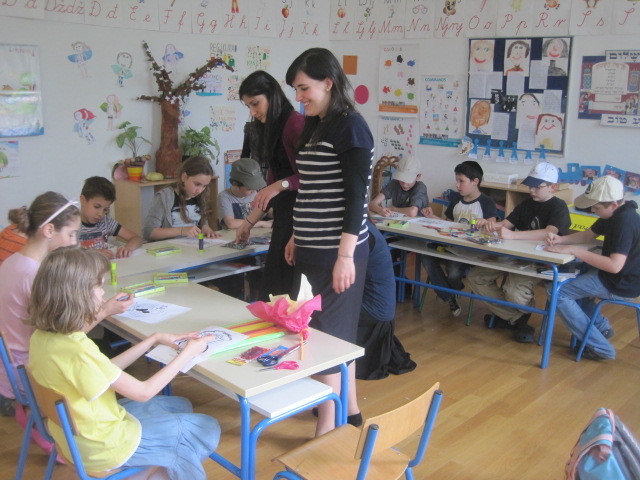Touro’s Lander women teach in Croatia
On the itineraries of Jewish travelers, Croatia lacks the depth of Jewish experiences found in Poland, Czech Republic and Hungary, but in early June, four students from Touro’s Lander College for Women traveled to the 20-year-old Balkan country to visit its Jewish community, which numbers approximately 2,500, mostly in the capital city of Zagreb.
“From the moment we landed we were involved in a flurry of activities,” Alon said. “Unlike life in major Jewish metropolises, many amenities are either scarce or non-existent. The population is eager to learn more about their Jewish heritage, to learn more Torah, exchange thoughts and ideas, and to connect with their American sisters and brothers.” The students engaged with their Croatian counterparts in Torah learning, English lessons, and distributing kosher food.
“Our mission was to inspire the Jewish community, give classes and lectures to young and old alike, to offer them chizuk and to create a bond with our far-away brethren,” said Cochava Alon. “This was a truly unique experience for us, but its impact was even more remarkable.”
The trip was led by Rabbi Dovid Goldwasser, a renowned speaker and author, who also teaches Jewish studies at LCW. Rabbi Goldwasser is no stranger to the region, having previously led chizuk missions to neighboring Bosnia-Herzegovina and Serbia.
“This is a great opportunity and I’ve always wanted to practice kiruv,” said Miriam Kahn, a sophomore majoring in biology. “It’s mainly a secular community but they cherish traditions and want their children to understand Jewish values.” Under the Bet Israel organization, the local Jewish community enjoys a new synagogue and the Lauder Hugo Kon School, which offers an elementary education alongside cultural programs.
Located at the crossroads of central, eastern and southern Europe, the Jewish presence in Croatia dates to the Roman period, augmented by an influx of Sephardim fleeing the Spanish inquisition. The relative tolerance of the Habsburgs allowed great synagogues and scholars to flourish in Croatia. The Nazi invasion in 1941 installed a collaborationist regime that nearly exterminated the community in Croatian-operated concentration camps, including Jasenovac and Stara Gradiska. 516 of the 18,830 Jewish women and children are buried in the Djakovo Cemetery in eastern Croatia. On June 5, the students attended a memorial ceremony at the site. While Croatia’s wartime role continues to cast a shadow, much of the community’s focus is on the future, in expanding Jewish educational programs.
“It was inspiring to learn with them. They were looking at our books with awe,” said Kayla Carmen, a senior majoring in graphic design. A native of Detroit, Carmen’s only previous foreign experiences were Canada and Israel. “I never know when I would have such an opportunity again.”
Touro’s visit to Croatia provided such an inspiration that it was documented by a local news station and a special song composed in their honor by a local choir. “Their young voices rang out with gusto as they sang a special song,” Alon said. The highlight of the weeklong trip was a communal Shabbat meal and lecture by Rabbi Goldwasser titled, “Faith During These Challenging Times.” Prayers were led by the country’s Chief Rabbi Kotel Dadon. “Everyone felt uplifted and inspired by the entire Shabbos experience,” Alon said.
As the young owmen learned, their teachers approached Rabbi Goldwasser about American Jewish day schools. Rabbi Goldwasser offered insights on how to implement American innovations in Croatian schools. “We had developed a special respect for the members of the Zagreb community who cling to their Jewish religion with mesiras nefesh and genuinely thirst for more Torah knowledge and a stronger connection to Hashem, Alon said.

 47.0°,
Fair
47.0°,
Fair 




